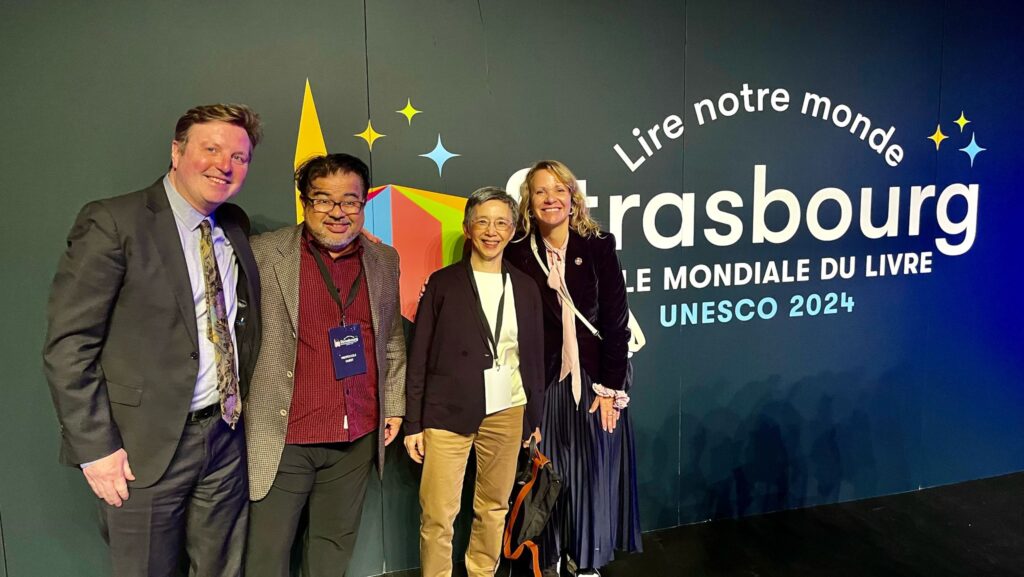Amid the growing challenges of climate action, one thing is clear – our sector’s climate response cannot afford to be slow, symbolic or siloed. It is one of the reasons why the panel discussions held at the various international book fairs are so important. No one part of the book value chain holds the magic bullet to solve our collective challenges. Too often we overestimate our own understanding of the challenges and opportunities we face in our respective parts of the value chain.
As such it was refreshing to see the opening day afternoon panel of Bologna Children’s Book Fair and Bologna Book Plus focus on their first sustainability summit. An impressive lineup of 8 panellists highlighted the complexities our sector faces when it comes to climate action, ranging from new (mainly EU) regulations to moving beyond incremental action while recognizing there are bigger challenges such as overproduction and waste that need to be addressed.
These conversations continued in Strasbourg during the penultimate conference hosted as part of the World Book Capital programming. Rencontres internationals de l’Ecologie pour le livre organized by the City of Strasbourg, the University of Strasbourg and the Région Grand Est (and in partnership with the Syndicat de la librairie française) covered a broad range of ecological themes. Topics switched from climate action and decarbonization, to social and equity issues associated with bibliodiversity and the impact of book donations.
What does this mean for the publishing industry in 2025? Here are my 4 key reflections from the conversations so far:
- It’s time to focus on the business case: Climate action in our industry accelerated back in 2021. It was at the time when the IPA, alongside many other organizations in the book chain issued a joint statement to prioritize climate action and we saw many publishers make net zero commitments. But as it stands in 2025, the world has changed. Climate action can no longer just be a moral obligation, it must make business sense – and it does. Climate action in 2025 must also mean being more efficient and reducing our costs. Take for example, overproduction and waste. Arguably, we all benefit from being more efficient. Using less paper and energy to print and distribute books is a good a thing not only for the climate but for the bottom line as well.
- Good decisions require good data: The focus up until now has been on getting started. It makes sense to prioritize key collective actions that will lead to the biggest reductions. Yet, in 2025 the data doesn’t really exist in many parts of the supply chain. There is a lot of ad-hoc research being conducted, for example, on lifecycle analysis of educational materials, or second-hand books. While this is good news, it also remains siloed in our local markets and contexts. This screams opportunity for our global sector to define how we want to measure climate action progress. We need a roadmap of data we want to collect and a way of achieving this across all our markets and sectors.
- We need to upskill our supply chain partners: Many of the bigger publishers will be using 2025 to grapple with complex environmental regulations such as the EU Deforestation Act or, if you a one of the lucky few, the European Corporate Sustainability Reporting Directive. While focused on larger organizations, many of these emerging regulations require data, often new sources of data not previously being collected, from smaller supply chain partners. The emerging gap between the data needs (from a regulation perspective) and the ability for our supply chain partners to report reliable and accurate data is expected to grow. Again, we need to upskill and equip our supply chain partners as this will be essential to our continued progress.
- We need to trust each other: Our ability to take data-informed decisions increasingly relies on establishing and fostering trust. We need to trust our broader value chain to have open and frank conversations. We need to trust each other to feel confident to share data. We need to trust each other to try new innovative solutions that go against established practices. In 2025, we must all ensure climate remains on the agenda at our book fairs and events to encourage ongoing climate conversations. Climate action is not optional and we can all use our own voices in our organizations to foster the urgency, resilience and practical change needed to continue our shared climate action journey.

